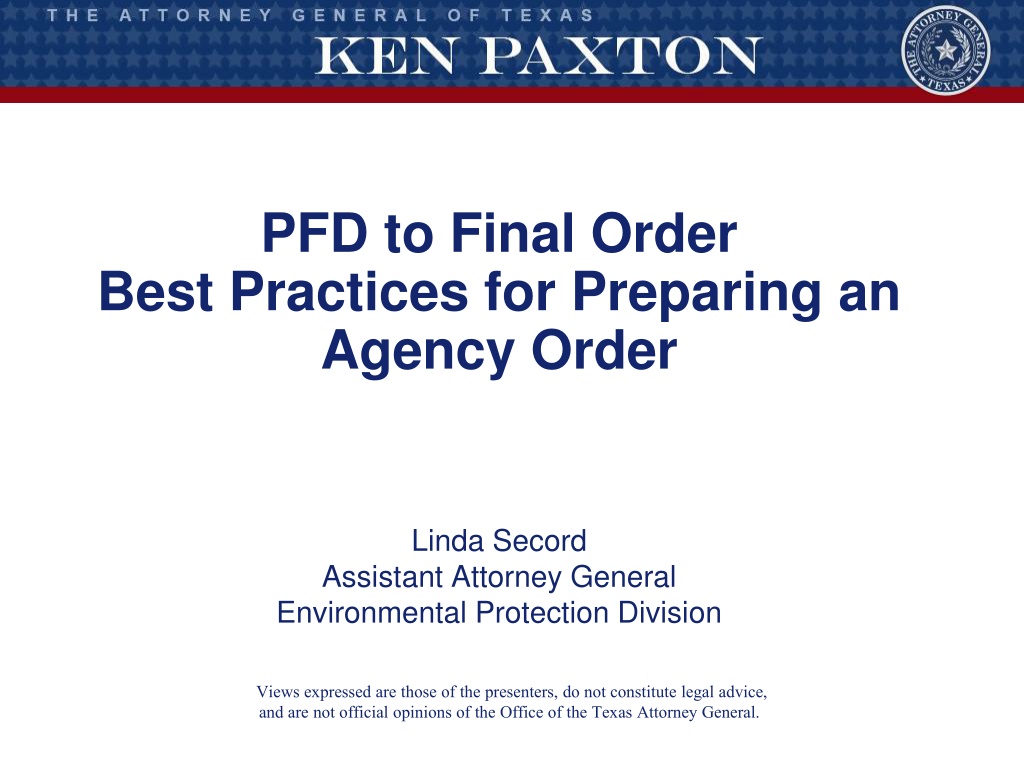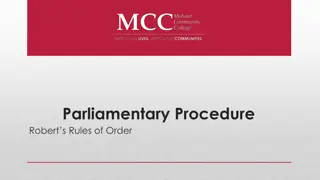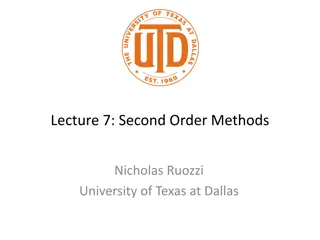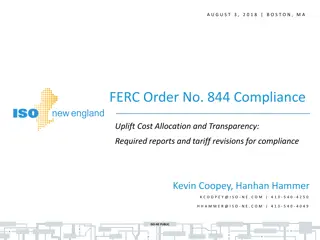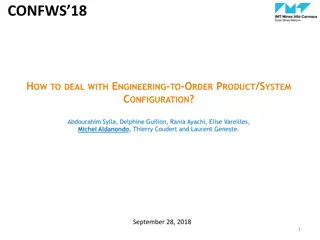Guide to Crafting a Comprehensive Agency Order
Learn about the essential components of a Proposal for Decision (PFD), including its importance, contents, and the process involved in preparing, waiving, and presenting it for agency decision-making. Understand the critical role of findings of fact and conclusions of law in the final order, as well as the options available to parties involved in contested cases.
Download Presentation

Please find below an Image/Link to download the presentation.
The content on the website is provided AS IS for your information and personal use only. It may not be sold, licensed, or shared on other websites without obtaining consent from the author. Download presentation by click this link. If you encounter any issues during the download, it is possible that the publisher has removed the file from their server.
E N D
Presentation Transcript
PFD to Final Order Best Practices for Preparing an Agency Order Linda Secord Assistant Attorney General Environmental Protection Division Views expressed are those of the presenters, do not constitute legal advice, and are not official opinions of the Office of the Texas Attorney General.
What is a PFD? The formal name is Proposal for Decision Ideally, it should contain Background Issues Positions of the Parties Analysis and decision
A PFD must State the reason for the proposed decision State each finding of fact and conclusion of law necessary to the proposed decision Be prepared by the person who heard the hearing or someone who has read the record
Do you have to have a PFD? Yes contested case majority of agency officials making decision have not heard the case or read the record Tex. Gov t Code 2001.062
But do you really have to have a PFD? Not if the parties waive by written stipulation. Tex. Gov t Code 2001.062(e)
What happens to a PFD? Served on each party Adversely affected parties can file exceptions and briefs Other parties can file replies and briefs ALJ can amend Then it can be presented to the officials making the decision
The order Must be in writing Must be signed by a person authorized by the agency Must include findings of fact and conclusions of law Separately stated Can adopt the findings and conclusions in PFD Tex. Gov t Code sections 2001.141(a)(b)
Findings of Fact: requirements Based only on evidence and matters officially noticed If stated in statutory language, must be accompanied by Concise Explicit Statement of underlying facts Tex. Gov t Code section 2001.141(d)
Theres two kinds of findings of fact?? Yes! Ultimate Findings = those set out in statutory language Underlying Findings = facts supporting ultimate findings
Why do we have underlying fndings? To ensure that the agency gives full consideration to the evidence and a serious appraisal of the facts. Gibson v. Tex. Mun. Retirement System, 683 S.W.2d 882 (Tex. App.---Austin 1985, no writ)
What do underlying findings look like? No precise form courts don t perform hyper-technical review BUT Findings must inform the parties and courts of the basis for the agency decision So the parties may intelligently prepare an appeal So the courts may perform their review function Goeke v. Houston Lighting and Power Co., 797 S.W.2d 12 (Tex. 1990)
What if the parties submit findindgs? Section 2001.141(e) requires the order to include a ruling on each proposed finding and conclusion submitted by a party under a state agency rule. BUT This only applies if the agency has a rule allowing parties to submit proposed findings and conclusions. Meador-Brady Management Co. v. Texas Motor Vehicle Comm n, 833 S.W.2d 683 (Tex. App.---Austin 1992), rev d on other grounds, 866 S.W.2d 593 (Tex. 1993)
Emergencies If an order must be immediately effective, it must incorporate a statement of the factual/legal basis establishing imminent peril. Tex. Gov t Code section 2001.144(3)
Can the agency change the findings? Yes, but . . . . . . . . . . . . . .
2001.058(e) Agency can change ALJ s finding or conclusion ONLY ALJ did not properly apply or interpret applicable law agency rules written policies provided by agency prior administrative decisions
2001.058(e) Agency must state specific reason and legal basis
Uh-Oh Hyundai Motor America v. New World Car Nissan, Inc., 581 S.W.3d 831 (Tex. App.---Austin 2019, no pet.) do not insert not do not restate the terms of 2001.058(e) do not add basic fact findings Do identify which applicable law was misinterpreted explain why that was incorrect explain how the agency reached the opposite conclusion Support changes with citations to record evidence
Do all agencies have to follow 2001.058? No TxDOT Tex. Transp. Code section 201.112 PUC Tex. Gov t Code section 2003.049 TCEQ Tex. Gov t Code section 2003.047
TxDOT State v. Mid-South Pavers, Inc., 246 S.W.3d 711 (Tex. App.---Austin 2007, pet. denied) Transportation Code supercedes 2001.058(e) notwithstanding any law to the contrary Written statement of reason and legal basis required Agency s statement inadequate because it switched witness credibility without independent evidence
PUC Tex. Gov t Code section 2003.049(g) Notwithstanding section 2001.058, PUC may change ff/cl ALJ misinterpreted/ misapplied applicable law or Issued a finding not supported by preponderance of the evidence
SPS v. PUC Southwestern Public Service v. PUC, 2018 WL 1977120 (Tex. App.---Austin April 26, 2018, no pet.) (mem. op.) not supported by a preponderance of the evidence means: PUC can reevaluate the evidence and substitute its judgment for the ALJ s on fact questions BUT Must state the specific reasons and legal bases for change
SPS v. PUC PUC s written explanation was adequate: Impliedly found not supported by a preponderance Generally stated that the change was based on the totality of the record Stated that change fell within range of record evidence Listed factors and made express findings on them
TCEQ Texas Gov t Code section 2003.047(m): TCEQ may amend a PFD, including a finding, based solely on the record before the ALJ an explanation of the basis of the amendment Texas Gov t Code section 2003.047(n): Ch. 2001 applies to extent not inconsistent with this section
Dyer v. TCEQ Dyer v. TCEQ, 2019 WL 5090568, (Tex. App.---Austin, October 11, 2019, no pet. h.) (mem. op.) Based on plain language of both 2001.058(e) and 2003.047(m), 2001.058(e) does not apply Court reviewed record and concluded there was evidence before ALJ to support TCEQ s changes TCEQ explanation found adequate Narrative explanation Specifically listed each change
Dyer v. TCEQ Dissent would hold that 2001.058(e) and 2003.047(m) not inconsistent 2003.047(n) requires that they be read together TCEQ must meet requirements of both
Yet more TCEQ Section 361.0832 of the Texas Health and Safety Code Commission may overturn Underlying findings if not supported by the great weight of the evidence Conclusions if clearly erroneous Ultimate findings (statutory standards) for reasons of policy only
And still more TCEQ Section 361.0832 of the Texas Health and Safety Code Commission order must fully explain reasoning and grounds for overturning ff/cl or rejecting ultimate finding In event of a conflict, this section controls over 2001.058(e) Two cases: Hunter v. TNRCC, 910 S.W.2d 96 (Tex. App.--- Austin 1995, writ denied); Heritage on San Gabriel v. TCEQ, 393 S.W.3d 417 (Tex. App.---Austin 2012, pet. denied).
